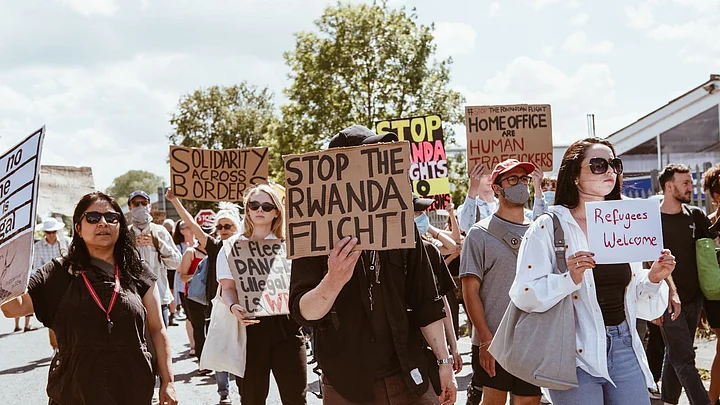The first flight scheduled to deport asylum seekers from the United Kingdom to Rwanda as part of a controversial British policy was cancelled on Tuesday, 14 June.
The number of those due to be put on the flight dwindled from an original 130 to seven on Tuesday, and then to zero after an eleventh-hour ruling from the European Court of Human Rights (ECHR) on Wednesday.
The EHCR noted that at least one of the asylum seekers should stay in Britain as there was no guarantee for his legal future in Rwanda, which had agreed to take in a number of refugees bound for the UK in a contentious deal with London.
'We Will Not Be Deterred': British Govt
British Home Secretary Priti Patel, who is leading the policy implementation, said she was disappointed that "legal challenge and last-minute claims," reported news agency Reuters. Patel called the ECHR intervention "very surprising" and vowed that "many of those removed from this flight will be placed on the next."
"We will not be deterred," she said in a statement, adding, "Our legal team is reviewing every decision made on this flight, and preparation for the next flight begins now."
The flight cancellation comes as a setback for Johnson's Conservative government after Foreign Secretary Liz Truss asserted on Tuesday that the plane bound for the Rwandan capital of Kigali would leave no matter how many people were on board.
Meanwhile, Rwanda said that it was still committed to taking in asylum seekers sent by the UK. "Rwanda stands ready to receive the migrants when they do arrive and offer them safety and opportunity," the government was quoted as saying by news agency AFP.
What Did the EHCR Say?
On 13 June, the European Court of Human Rights in Strasbourg received a request to indicate an urgent interim measure to the UK government, in relation to an Iraqi national named KN, who, having claimed asylum upon arrival in the UK on 17 May, was facing removal to Rwanda on the evening of 14 June.
"The Court had regard to the concerns identified in the material before it, in particular by the United Nations High Commissioner for Refugees (UNHCR), that asylum-seekers transferred from the United Kingdom to Rwanda will not have access to fair and efficient procedures for the determination of refugee status as well as the finding by the High Court that the question whether the decision to treat Rwanda as a safe third country was irrational or based on insufficient enquiry gave rise to “serious triable issues."EHCR
The European Court on Wednesday indicated to the UK government that the applicant should not be removed to Rwanda until three weeks after the delivery of the final domestic decision in his ongoing judicial review proceedings.
PM Boris Johnson's Defence of Rwanda Plan
The UK's new Migration Partnership with Rwanda is part of a five-year trial launched by UK Home Secretary Priti Patel in April this year, in which some asylum seekers deemed to have entered the UK illegally are transported to Rwanda to claim refuge there.
They will get accommodation and support while the Rwandan government considers their application, and if they are successful, they can stay in the country with up to five years' access to education and support.
As per the British government, if their asylum claim is unsuccessful, they will be offered the chance to apply for other immigration routes or face deportation from Rwanda.
Prime Minister Boris Johnson on Tuesday defended the widely-condemned deportation strategy and pledged to continue with it.
Speaking at the start of a weekly cabinet meeting at 10 Downing Street in London, Johnson had stated that the government would not be "deterred" or "abashed" by the criticism of the policy.
"We are not going to be in any way deterred or abashed by some of the criticism that is being directed upon this policy – some of it from slightly unexpected quarters," said Johnson.
"What is happening with the attempt to undermine the Rwanda policy is that they are, I'm afraid, undermining everything that we're trying to do to support safe and legal routes for people to come to the UK and to oppose the illegal and dangerous routes. That is what we are trying to do, that is the essence of our policy," he said.
(At The Quint, we question everything. Play an active role in shaping our journalism by becoming a member today.)
